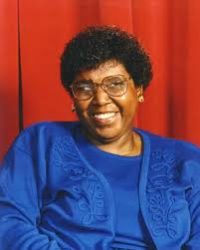Barbara Jordan
Contents
Country
United States
Birth - Death
1936 - 1996
Occupation
Politics
Notable Achievements
Presidential Medal of Freedom
Description
Barbara Jordan was an active member of the American Civil Rights movement whose particular impact was felt in the political realm. She went further than any other individual of her time by participating in the political process as a means of advancing this cause. In the end, she broke many political barriers for women and blacks and made history.
Born in the heart of the south in the state of Texas, Jordan studied to become a lawyer. Because of segregation laws, Jordan could not attend the University of Texas but instead attended Texas Southern University, graduating magna cum laude in 1956. She followed this by attending Boston School of Law.
After a short stint of teaching, Jordan returned to Texas to begin a private practice of law in 1960. She twice ran unsuccessfully for a seat in the State of Texas House of Representatives. Finally, in 1966 she won a seat as a Democratic Party member in the Texas Senate and became the first African American to serve in that political institution, though she initially did not receive a warm welcome from other lawmakers. During her service, she became the first black President of the Senate. Jordan remained in that post until 1972.
At that time, Barbara Jordan ran for a seat in Congress and was elected in a landslide. Her role in the Democratic Party increased substantially and, in 1976, she was the first black woman in history to address the Democratic National Convention. She remained active in politics even after she retired in 1979 when, unbeknownst to the public, she was diagnosed with multiple sclerosis. On her retirement from politics, she became a Professor in Ethics at the University of Texas – the same institution she could not attend as a youth.
Throughout, Barbara Jordan was never shy about communicating the important advances she was personally making against discrimination on several issues, notably race and gender. She summriazed her career and accomplishments in her autobiography ‘Barbara Jordan: A Self Portrai’ (1979). In 1994, President Bill Clinton presented her with the Presidential Medal of Freedom. She died in 1996 after a long battle with leukemia.
Many compatriots have praised Barbara Jordan’s oratory skills as a key factor to her success. She sponsored bills that championed the poor and people of colour, minimum wage laws, motions to increase the voting rights of marginalized citizens, amendments to the U.S. constitution, and to encourage unity in the country on many divisive issues. To this day, the Barbara Jordan National Forum on Public Policy is held annually in her honour.
Jordan’s partner of 30 years was Nancy Earl. Earl participated in writing the speeches of Jordan and actively campaigned for her. However, Barbara Jordan never publicly acknowledged her same-sex relationship during her lifetime. Indeed, she was specifically advised by her political associates not to bring her life partner on the campaign trail with her. Jordan remained deeply closeted publicly, but her friends mention her ease with her relationship privately.
At one point, Nancy Earl saved Jordan’s life when she had a heart attack while swimming in her pool at home. It was only at this point that Jordan’s affliction with multiple sclerosis was revealed to the public.

